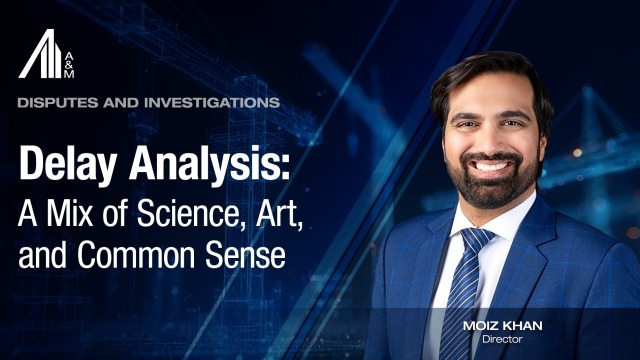Impact of Supply Chain Disruptions on Energy Infrastructure Disputes: Takeaways from Paris Arbitration Week
The energy infrastructure sector is facing increasing disruption from geopolitical and economic pressures, while digital technologies are reshaping how companies manage risk and resolve disputes. At Paris Arbitration Week, Alvarez & Marsal (A&M) and DLA Piper hosted a panel of leading experts to discuss how these global shifts are changing the dynamics of arbitration in energy infrastructure disputes.
The panel featured Andrew Drennan, Chartered Quantity Surveyor and Managing Director with A&M Disputes and Investigations and leader of the Construction Disputes practice; Riaz Hussain, barrister at Atkin Chambers; Chakir El-Azzouzi, director group and global contracts management at Technip; and François Thuault, independent arbitrator. The session was moderated by Anna Mills, partner and global co-chair of DLA Piper’s International Arbitration practice.
Here are the key takeaways from the session:
Tariffs and Trade Disruptions Are Reshaping Energy Supply Chains
Tariffs, sanctions and geopolitical instability are causing delays and escalating the costs of infrastructure projects. Panellists cited geopolitical conflict, the COVID-19 pandemic and the Suez Canal blockage as examples of global events directly disrupting material availability, logistics and procurement. There has also been shifts in global resource availability as contractors and suppliers move toward emerging hubs such as Saudi Arabia.
This trend is prompting companies to reevaluate the impact of supply chain volatility and trade policies on project outcomes and contractual strategies. The discussion emphasised the importance of early identification of supply chain vulnerabilities, enhancing contract clarity around disruption risks and adopting smarter tools to anticipate and manage the downstream effects of unexpected global events.
Contracts Must Adapt to Complexity and Context
While clauses such as force majeure or Australia’s Equivalent Project Relief provisions are often relied upon in certain jurisdictions, they do not always reflect the operational realities of large-scale infrastructure projects. Speakers emphasized the risks of relying solely on contractual language without considering the broader commercial and regulatory landscape, including joint venture dynamics, subcontractor vulnerabilities and the evolving nature of regulatory frameworks.
Understanding how parties are governed, and how local laws interact with contractual obligations, is increasingly essential. Without this, projects risk misalignment, inefficiencies and ultimately, disputes.
AI and Contract Technology Are Gaining Ground
Artificial intelligence and advanced contract management tools are becoming increasingly prominent in overseeing projects and managing large-scale disputes. The panel explored the use of contract management platforms, gap analysis tools as well as timeline builders that help track obligations, version changes and scope adjustments across complex infrastructure projects. AI-powered search and document analysis tools were highlighted for their value in arbitration, enabling teams to identify key information earlier in the process. As a panelist noted, these technologies are helping teams become “better, faster, stronger”. However, their effectiveness ultimately depends on the quality of the structure, processes and judgement behind their implementation.
Due Diligence Must Extend Beyond First-Tier Suppliers
Supply chains are becoming increasingly complex and multi-layered, with risks often emerging several layers away from the direct contract. The panel emphasised the increasing necessity for thorough due diligence within the supplier ecosystems, from pricing structures and operational capacity to political ties and international dependencies. Gathering this information early is crucial to pinpointing vulnerabilities and preventing potential disputes down the line.
Lessons Learned Must Translate to Real Change
One of the final takeaways from the panel was the importance of not only conducting a “lessons learned” review at the end of a project but also making tangible changes based on the insights gained. Too often, valuable findings are documented but not acted upon. The panel emphasized the value of investing in experienced claims professionals, negotiating more practical operational clauses and aligning organizational cultures early in the project lifecycle as practical ways to minimize friction in future engagements. They also stressed the need for openness, early identification of issues and consistent documentation throughout project execution. As one panellist put it, “to address an event, you first have to capture it” – underscoring the importance of proactive communication and meticulous recordkeeping in preventing disputes.





